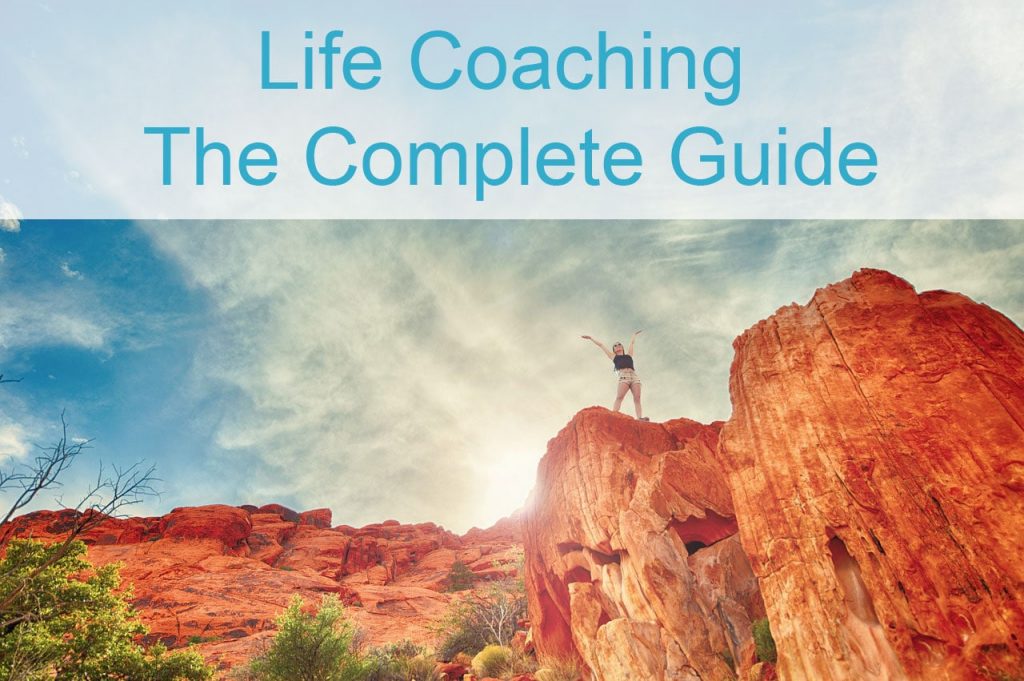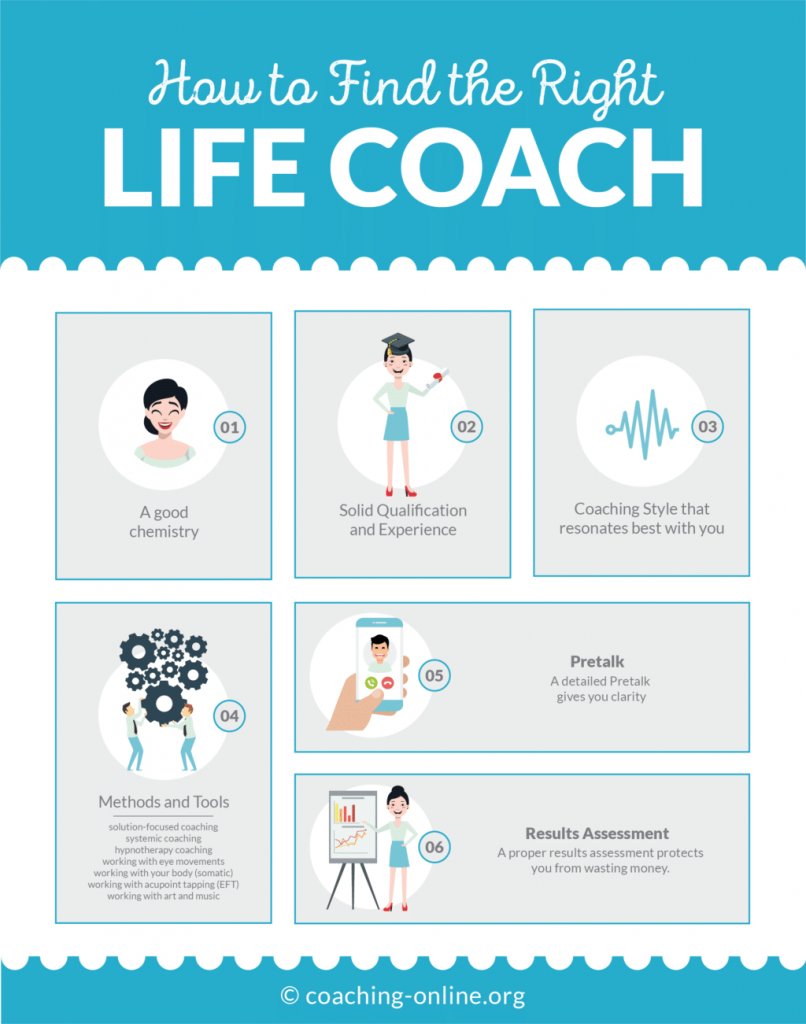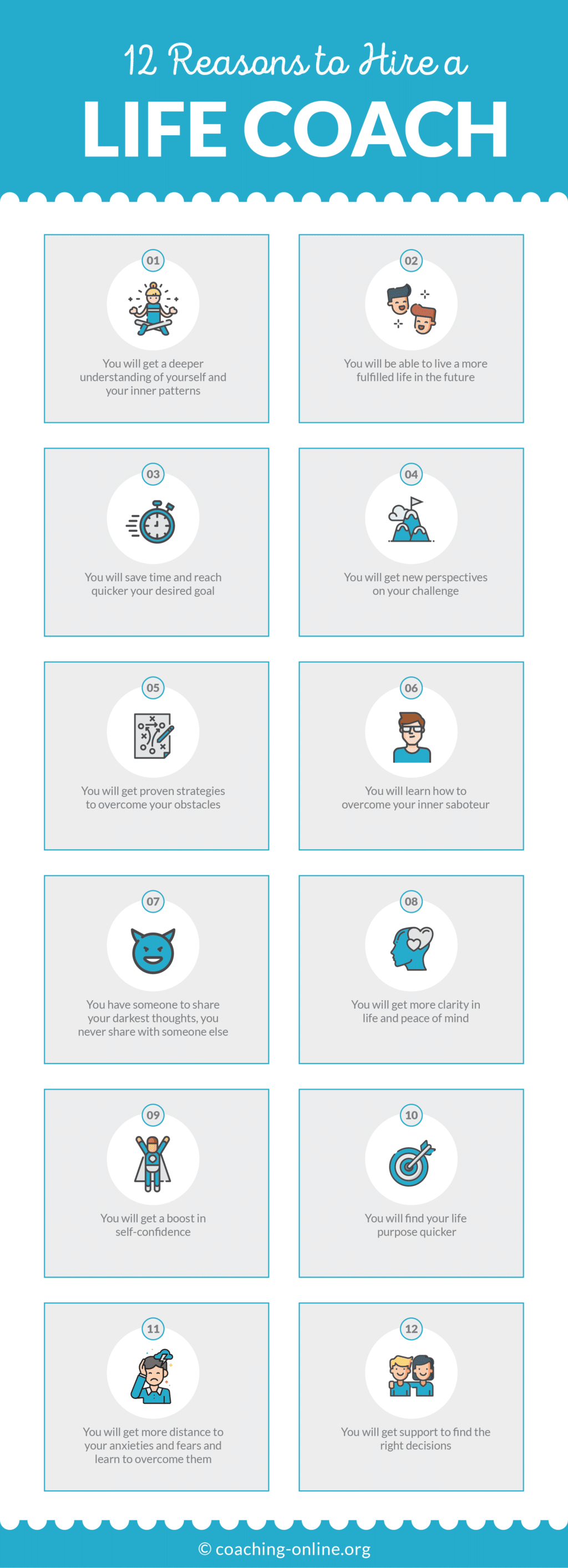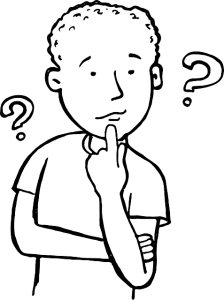This is the most comprehensive guide to life coaching online.
In this expert-written guide, you’ll learn everything you need to know about life coaching, including:
- finding the right life coach (qualifications, skills, methods, etc.)
- checking if you need one,
- reasons and benefits to hire one,
- questions you maybe asked,
- and a lot more.
My “Life Coach – The Complete Guide 2024“ answers all your questions.
I’ll even show you how to get free life coaching online with a professional and how to become a life coach.
Let’s dive right into it:
- What is an Online Life Coach?
- What Does an Online Life Coach Do?
- What Life Coaching Doesn’t Do
- Do I Need Life Coaching?
- How to Find the Right Coach
- 12 Reasons to Invest in Life Coaching
- Benefits of Life Coaching
- Online Life Coaching
- Online vs. Offline Coaching
- Coaching vs. Therapy
- Questions
- Certifications and Qualification
- Life Coaches Near Me
- Free Life Coaching
- My Approach
What is an Online Life Coach?
An online life coach is a professionally qualified person who helps you to reach your desired goals or guides you through personal challenges.
What is the Role of an Online Life Coach?
A life coach should be a sparring partner at your side with whom you can look at your actual situation and challenges.
Ideally, she sees herself as a service provider for you.
She recognizes you as the authority in the coaching process.
Usually, you know best what is helpful and what is not.
What Does a Life Coach Do?
The most important skill of an online life coach is asking the right questions about their client’s lives.
With the right questions, a life coach can give you new perspectives on your situation.
This can be especially tricky to do on your own when you feel stuck!
A life coach also encourages you and gives you a realistic view of your abilities and strengths.
Most often, people focus too much on their weaknesses.
Does this resonate with you?

Related: 14 Most Effective Coaching Models To Help Your Clients Thrive
What Life Coaching doesn’t do
Usually, a life coach does not provide you with any advice on how you “should” fix a problem or how to cope with a challenge.
A life coach will rarely give coaching advice based on her own personal experiences.
This makes a difference to a career coach for example.
Rather a life coach should guide you by coaching you to find your own individual solution for your unique life problems.
You might be wondering:
Do I Need a Life Coach?
The human body and brain are unbelievably strong. They can stand more physical and mental pain than you would expect.
So you have this naturally given strength and there will always be a way and solution without external help.
However, often we are trapped in our own behavioral pattern and unconscious processes that are running our lives on autopilot.
To unveil these, a life coach can be invaluable.
A good life coach will bring you much quicker, and with less suffering towards your desired goal.
We tend to hire teachers and coaches for all kinds of things…
For learning an instrument, a language or your favorite kind of sport.
If it’s an instructor at your gym or a mentor at your workplace.
So why not consider hiring a life coach that shows you how your brain works?
Deeper insights into your own patterns are mostly the tip of the iceberg to resolve your knot.
A good life coach should guide you a step closer to yourself. A deeper understanding of yourself is invaluable for living a more fulfilled life in the future.
A life coach can also provide you with useful techniques, strategies, and exercises to support you in coping with your individual challenges.
So why not give a life coach a try?
The challenge can be to find the right coach…
…but don’t worry, I have some answers for you…
How to Find the Right Coach

Are You Resonating With the Person?
You should immediately have a good feeling with the person.
When the chemistry fits between you and the life coach, she can be an effective guide at your side.
Studies have shown that the alliance between you and the coach is the most important factor for
I would highly recommend that you ask your potential candidates some simple, but important questions.
Here are the right questions to ask a potential coach.
Qualification and Experience
A good life coach should have a profound education, qualification, and experience.
This assures that the life coach works professionally and follows a goal-orientated structure.
There are so many certificates for coaches, so it can be hard to evaluate the right one. Therefore I wrote a detailed separate section about “Certification and Qualification” which follows later in this article.
Coaching Style
Every life coach brings in her unique personal coaching style.
Many have a very empathic and gentle attitude, although some are more distant and challenge you with provocative questions.
Think about which coaching style resonates best with you.
Methods and Tools
In the coaching and therapy world, there are different approaches to help you reach your desired goal.
If you like to talk, try these ones:
- regular coaching/therapy
- solution-focused coaching
- systemic coaching
- etc.
If you prefer not to talk so much, check out these:
- working with eye movements
- working with your body (somatic)
- working with acupoint tapping (EFT)
- working with art or music
- working with animals
- etc.
If you feel especially stuck, you could try methods which involve your subconscious:
- hypnotherapy / coaching
- hypnosystemic therapy / coaching
- etc.
If you want to dig deeper into the different types of coaching and therapy, here you find a complete list.
This is important though:
Schedule a Pretalk
After checking the background of different candidates, you should have a pretalk with 2 or 3 candidates of your choice.
Only the direct interaction will show you how the chemistry between both of you will be.
Ask actively about a Pretalk and schedule one.
Every serious life coach should have around 30 minutes time for you.
One question you should definitely ask is about results assessment…
For perfect coaching preparation, sign up in the form below to get my FREE pretalk questions checklist.
Results Assessment
Coaching without a proper results assessment can be a waste of time and money!
Your goal is to reach certain targets, so it should be part of a professional coaching process to measure the results.
Your potential candidate should explain in detail, how he measures your results.
If you found “the one,” here are some more reasons why you should hire a coach…
12 Reasons to Invest in Life Coaching

- You will get a deeper understanding of yourself and your inner patterns
- You will be able to live a more fulfilling life in the future
- You will save time and reach your desired goals quicker
- You will get new perspectives on life challenges
- You will get proven strategies to overcome your obstacles
- You will learn how to overcome your inner saboteur
- You have someone to share your inner thoughts and feelings, that you may never share with someone else
- You will get more clarity in life and peace of mind
- You will get a boost in self-confidence
- You will find your life purpose quicker
- You will get more distance to your anxieties and fears and learn to overcome them
- You will get coaching and support to find the right decisions
Benefits of Life Coaching
A successful coaching process will lead you closer to your inner self. Through better self-understanding, you will find your purpose in life much easier.
You will understand yourself and your different inner drivers more clearly. You will get more distance from your “usual” behavior patterns.
As a result, you will gain way more self-control and freedom of choice over how you react to different external triggers.
Online Life Coaching
These days more and more clients decide to work with an online life coach.
The possibility of getting online coaching independent from location and time from the best experts in the
You will find a variety of different coaching approaches in the online life coaching world.
- Video coaching sessions via
- Skype,
- Facebook Messenger,
- Special coaching presentation software
- WhatsApp Video Call,
- Viber,
- Telegram,
- etc.
- Audio coaching via
- Phone
- Phone + Web Whiteboard Presentation
- Web call via WhatsApp, Viber, etc.
- etc.
- Email coaching
- Messenger coaching
- A mix of personal and virtual coaching
- And so many others.
If you decide on using an online life coach, you will
You can also negotiate with your coach a combination of the communication options above.
For example, you can have a Skype video coaching session first and afterward 1 or 2 email consultations to have a quick check-in and review of your results. If you are ready, then for the next steps you can schedule the next video life coaching session.
Most online life coaches are pretty flexible.
Online vs. Offline Coaching
The following table shows you the advantages and disadvantages of online and offline life coaching.
| Pros | Cons | |
| Offline (Traditional) Coaching | Provides a “safe space” for therapy No distractions Physical closeness is comforting Necessary for serious mental health issues Necessary for certain types of coaching (art, drama, music, animal-assisted, etc.) | Expensive Time-consuming (scheduling, traffic, etc.) Limited coaching options Possible long wait times |
| Online Coaching | Affordable Convenient Many modes of communication (text, audio, video) Easy to contact coach quickly in times of need Huge variety of coaching options | Some forms of coaching are less effective or can’t be done online Creating an environment conducive to coaching is up to you |
There are definite advantages a virtual life coach offers.
Another common question of life coaching…
Coaching vs. Therapy
What is the difference between coaching and therapy
My teacher is a doctor in medicine and teaches therapists and coaches.
He put it simply:
Coaching is for healthy people and therapy is for sick people.
This is the easiest and most understandable breakdown I have ever heard of this complex question.
As soon as there is a medical diagnosis, you should see a therapist or psychiatrist.
One of the essential skills of a life coach is to know her limits and to hand over a client to a therapist, if necessary.
However, in daily practice, there is a fluent transition between coaching and therapy. Depending on the skills and education of a coach, a coaching session can be very similar to a therapy session.
In all honesty, there are excellent and bad therapists as well as excellent and bad coaches. I personally know a lot of cases, where clients had a breakthrough with a life coach after doing a lot of therapy.
And I’m sure there are also a lot of cases the other way around.
Now:
Questions?
You are
Here are some questions you will probably hear.

At the beginning of a coaching session:
- What is your actual challenge?
- What are your goals for this session?
- What are your goals for the whole coaching process?
- What would be the best outcome we could reach?
- On a scale from 0 to 10 how is your actual ability to cope with your challenge? (0 = not at all, 10 = very good)
While in a session:
- If tomorrow night a miracle were to happen and your problem was gone, what would be the consequences of it?
- What are the positive consequences of your challenge?
- How would your best friend describe you?
- How looks your inner dialog in your actual challenge?
- Have you had similar situations in your life before?
- How did you deal with them in the past?
- Are there times where it was easier to deal with your challenge and times where it was harder?
- If yes, what changed?
- What did you do differently in these scenarios?
- Do you have the feeling
that we are on the right track toward our goal?
At the end of a session
- On a scale from 0 to
10 how do you feel about your actual ability to cope with your challenge after our session? (0 = not at all, 10 = very good) - Is there something I/we can improve in the next session to be more effective?
- How does our communication feel for you?
Certifications & Qualifications

Unfortunately, there are no special requirements to call yourself a life coach. So anyone can do it.
Many organizations and associations offer education and accreditation for life coaches.
Here are the best-known ones, you can look for:
- ICF – International Coaching Federation, Largest Organization of professionally trained coaches. Globally active. Around 30.000 Members.
ICF has three ICF credentials:- ACC – Associate Certified Coaches (60 hours of training),
- PCC – Professional Certified Coaches (125 hours of training), and
- MCC – Master Certified Coaches (200 hours of training)
- ECA – Empowerment Coach Academy, smaller Association, around 100 life coaches listed on the website,
ECA also has three credentials:- ACELC – Associate (19.5 hours of training),
- PCELC – Professional (35 hours of training), and
- MCELC – Master (200 hours of training)
- IECL – Institute of Executive Coaching and Leadership
iPEC – Institute for Professional Excellence in Coaching, around 1.000 Coaches listed on its website
ICF is the most reputable certification body worldwide.
If you are not sure, which company to choose for your life coach education program look at my article – 6 Best Life Coaching Certifications Online ICF Accredited.
There are also some master’s degrees in the coaching field, which you can look for:
- Master of Science (M.Sc.)
- Leadership & Coaching (2 years, full time), Baltimore University
- Psychology – Leadership Development and Coaching (2 years, part-time), Walden University
- Advanced-level Coaching (2 years full time), Springfield College F
lorida
- Master of Arts (M.A.)
- Organizational Leadership (2 years, part-time) Lewis University
- Human Resource Management – Coaching Marymount
University
Have you ever thought about helping others, who are suffering from the same problems you have gone through?
Free Life Coaching
While my coaching education was extremely helpful for me, especially watching and listening to other coaches.
I also realized that we all are facing similar challenges in life.
Out of this experience there grew a vision.
I will provide free sound recordings of coaching sessions on this website, to reach a bigger audience and help tens of thousands of people.
If you can imagine supporting me with this idea, please sign up here for a free life coaching online session. Don’t worry, we can use a fake name so that you stay anonymous.
Life Coaches Near Me
Often, I get the question: “Where can I find a life coach near me?”
If you are searching for an “offline” life coach, there are different directories, where you can find a local life coach near you.
The best ones are:
- https://www.noomii.com/life-coaches
- https://www.mycoachmatch.com
- https://www.lifecoachhub.com/coach-directory
- http://coachinginst.com/life-directory
- https://www.linkedin.com/company/life-coach-directory
These resources should give you a good overview of, which coaches are available around your city or state.
I suggest having pretalks with at least 3 candidates of your choice.
If you wonder what questions to ask to find your perfect fit, just enter your email in the form below and you will get my FREE checklist.
My Approach
I see myself as a service provider for my clients.
You as my client always have the highest authority in the coaching process. Only you know best, what is helpful for you and what is not.
My role is to offer you different perspectives on your situation.
I like the comparison with a waiter.
“I’m a reality waiter.”
Dr. Gunther Schmidt
Additionally, I guide you professionally through inner exploration. Together, we go on a journey through your unconscious processes.
We explore powerful possibilities to change these,
Here you find more about me.
According to dictonary.com life coach is the correct way to write it.
Related Content
How to Become a Life Coach – 6 Easy Steps
Life Coach Salary – A Comprehensive Guide
66 Life Coaching Topics to Thrive